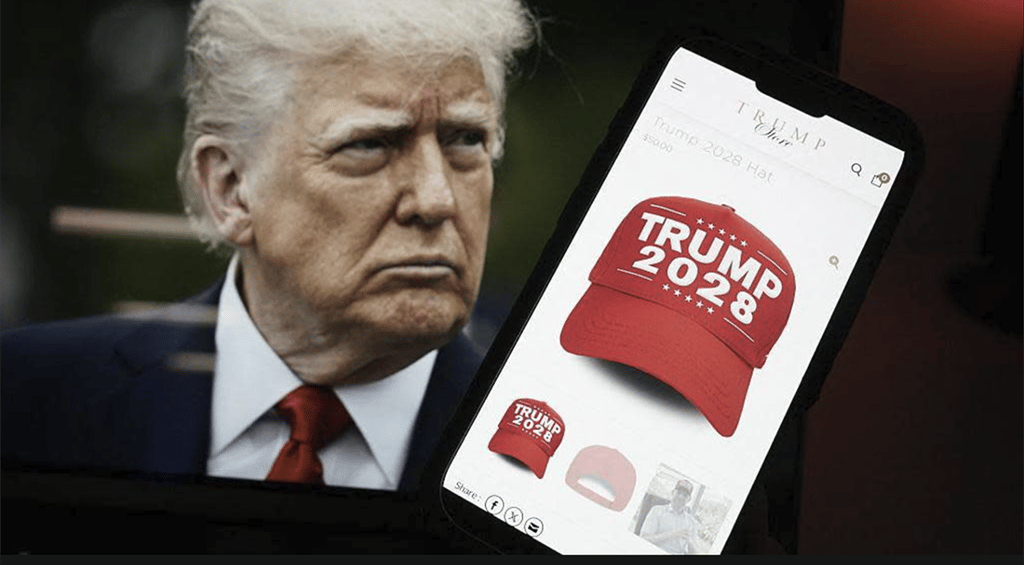Trump’s Third-Term Tease: A Political Power Play Freezing the 2028 GOP Field
4/26/20253 min read


Trump’s Third-Term Tease: A Political Power Play Freezing the 2028 GOP Field
Introduction: The Art of Keeping the Spotlight
Donald Trump, the master of political theater, is at it again. With “Trump 2028” hats and shirts popping up on his website, the former president is stirring speculation about a third term—an idea that’s constitutionally impossible without monumental changes. At 86 by 2033, Trump’s talk of rewriting the rules isn’t just a fleeting quip; it’s a calculated move to dominate the Republican narrative and keep potential 2028 contenders in limbo. Why does this matter? Let’s unpack how Trump’s third-term chatter is reshaping the GOP’s future.
The Constitutional Roadblock
The 22nd Amendment is clear: no president can serve more than two terms, consecutive or otherwise. Amending the Constitution to allow a third term requires a two-thirds vote in both the House and Senate, followed by ratification from 38 state legislatures—a near-impossible feat in today’s polarized climate. As former House Speaker Newt Gingrich bluntly put it, “He’s not going to run for another term.” Yet Trump’s flirtation with the idea isn’t about feasibility; it’s about control.
Why Trump Keeps the Third-Term Talk Alive
Trump thrives on attention, and this third-term buzz ensures he remains the GOP’s gravitational center. By floating the idea, he delays the inevitable lame-duck perception that dogs second-term presidents. Every headline about “Trump 2028” is a headline not focused on rising GOP stars like Ron DeSantis, Nikki Haley, or J.D. Vance. As Gingrich noted, Trump’s noise “starves his opponents” of oxygen, keeping the 2028 Republican field frozen in uncertainty.
This strategy also energizes his base. The $50 “Trump 2028” hats and $36 “Re-write the Rules” shirts aren’t just merch—they’re rallying cries for supporters who see Trump as a larger-than-life figure unbound by convention. The longer he teases the possibility, the longer he delays the GOP’s transition to a post-Trump era.
The Frozen 2028 Field
Trump’s shadow looms large over the Republican Party, and his third-term talk is a warning shot to potential 2028 contenders. Ambitious Republicans face a dilemma: declare their intentions too early, and risk alienating Trump’s loyal base; stay silent, and miss the chance to build momentum. Figures like DeSantis, who has carefully navigated his relationship with Trump, or Vance, a vocal Trump ally, can’t afford to misstep. Even less Trump-aligned figures like Haley are stuck, unable to fully break free from his influence without risking their viability in a Trump-dominated primary.
The data backs this up. A 2024 Pew Research poll showed 63% of Republican voters still view Trump as the party’s leader, even post-presidency. His grip on the base means any candidate hoping to succeed him must tread carefully, lest they be branded disloyal. Trump’s third-term chatter keeps these contenders in a holding pattern, waiting for a signal that may never come.
A History of Third-Term Teases
Trump isn’t the first president to toy with extending his tenure. Franklin D. Roosevelt ran for third and fourth terms, though that was before the 22nd Amendment was ratified in 1951. More recently, Barack Obama jokingly mused about a third term, and Bill Clinton once said he’d consider it if it were legal. But Trump’s approach is different—less a wistful “what if” and more a deliberate power play. His rhetoric, paired with branded merchandise, signals an intent to keep the GOP revolving around him, not the Constitution.
The Risks of Trump’s Gambit
This strategy isn’t without pitfalls. By delaying the GOP’s ability to coalesce around a new leader, Trump risks fracturing the party if his influence wanes unexpectedly. If he overplays his hand, he could alienate moderates or independents who see the third-term talk as a step too far. Plus, the longer he hogs the spotlight, the less time the next generation of Republicans has to build national recognition before 2028.
On the flip side, Trump’s base loves the defiance. His willingness to “rewrite the rules” reinforces his image as a disruptor, which could keep his influence intact even if he doesn’t run. The question is whether this benefits the GOP’s long-term electoral prospects or merely serves Trump’s ego.
What’s Next for the GOP?
As Trump continues to dangle the third-term carrot, the Republican Party remains in a state of suspended animation. Will he eventually step back and anoint a successor, or will he keep the party tethered to his brand indefinitely? The 2028 primary field is already shaping up to be a battleground, and Trump’s shadow will loom over every debate, endorsement, and campaign ad.
For now, the “Trump 2028” merch keeps selling, and the speculation keeps swirling. Whether it’s a brilliant tactic or a dangerous distraction, one thing is clear: Trump isn’t ready to exit stage left just yet.
Thought Questions for Readers
Do you think Trump’s third-term talk is a genuine ambition or purely a strategy to maintain influence? Why?
How should potential 2028 GOP candidates navigate Trump’s dominance without alienating his base?
Could Trump’s strategy backfire and weaken the Republican Party’s chances in future elections?
Photo credit: Yahoo.com
hello@boncopia.com
+13286036419
© 2025. All rights reserved.